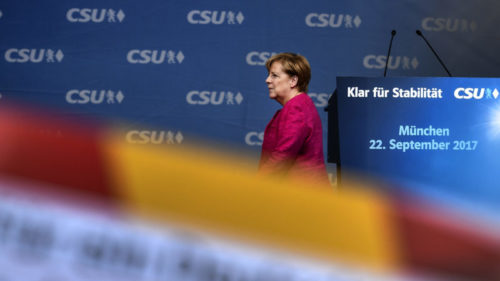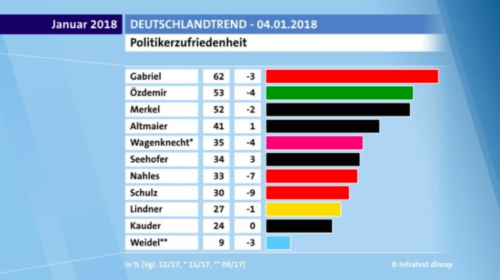Where will it lead us from here?
Some thoughts on German politics

Source: Euractiv
When I was following the recent German elections, I could not even imagine that it would produce never-ending coalition talks. My first thought was that Angela Merkel has been around for such a long time that it would be a good pub quiz question to ask who the chancellor was before her. While my personal memory still recalls the stronger days of SPD under Gerhard Schröder, for a significant generation of young Germans, she is basically the only chancellor they remember. Germany during the chancellorship of Angela Merkel has dominated the EU on every possible level. At the same time, the recent migration crisis and Merkel’s famous Wir schaffen das have left an eternal mark on German and European politics, with consequences beyond Europe.
However, I will focus only on Germany. The result of the German elections last September brought a dose of political uncertainty to the country whose brand is stability. So far, coalition talks between the conservative Union (CDU/CSU), the liberal FDP and the Greens have failed, with the only product being the unbearable usage of a Caribbean country in a political jargon. The liberals have left the talks in a well-calculated manoeuvre, while at the same time, the Greens are now switching their focus to internal party struggles, with the current leaders stepping down.
For the social democrats, last year was extraordinarily exhausting. Coming from a neck and neck polling with CDU/CSU, the party significantly failed at the elections and decided to go to the opposition to recover. However, the crisis of SPD is very deep, with challenges that the social democrats are facing around the EU. It will not be solved just by going back to the opposition, which is also a historical myth, as Professor Wolfgang Merkel recently argued for Social Europe.
Now, the situation is very uncomfortable for both the Union and the SPD. The tough coalition talks are ongoing and might be finished only after Easter, as the Union and SPD need to discuss issues ranging from the migrant policy and the EU to climate change and government investments. Otherwise, new elections would occur, which would bring additional instability, it would be very time-consuming and the results would probably be similar. At the same time, another grand coalition would strengthen the far-right, as the AfD would then be the main oppositional party. They are already using the Bundestag’s arena to promote their right-wing agenda, launching constant attacks on the incumbent government and the mainstream political parties.
Several media outlets such as Der Spiegel, The Washington Post and Foreign Policy have already started to bury Angela Merkel, and the recent opinion polls are showing that half of the population wants her gone. She apparently lost support from the party youth as well. Hence, this will quite possibly be her last term. A new Merkel government will be significantly weaker, to the disappointment of the enthusiastic French President Emmanuel Macron, who wanted a strong German partner to build a post-Brexit EU.
Regarding the SPD leader Martin Schulz, his campaign failures have continued in the post-election cycle, with his personal popularity strongly falling in opinion polls. At the same time, former SPD leader Sigmar Gabriel is now the most popular politician in Germany. Sigmar Gabriel continued on the image of a moderate German foreign minister, which his predecessor Frank Walter Steinmeier carefully built, and showed that many people underestimated him.

Source: ARD
Some journalists recently stated that with AfD, broadcasts of the parliamentary sessions are becoming much more interesting. Numerous analyses on German politics have been written, and there is an increased interest to look into the historical books and Weimar Republic. Additionally, there has been a lot of speculation who will be the successor of Angela Merkel, with potential candidates such as Jens Spahn, Ursula von der Leyen, Julia Klöckner and Annegret Kramp-Karrenbauer. Whoever comes to the helm of CDU, the Union will probably shift further right, in a similar style of Sebastian Kurz in Austria. Needless to say, there is a strong pressure from the very conservative Bavarian CSU, whose recent guest of honour was Viktor Orban. Their soon-to-be president Markus Söder was a strong critic of Merkel’s migration policies.
Wise people say that there is nothing permanent except change, but it is a change we need to get used to, whether we like it or not. The legacy of Angela Merkel is something that social science students will carefully study in years to come, and will be an intriguing reminder of how Germany and the EU once were, just like we view today the years of Willy Brandt or Helmut Kohl.
